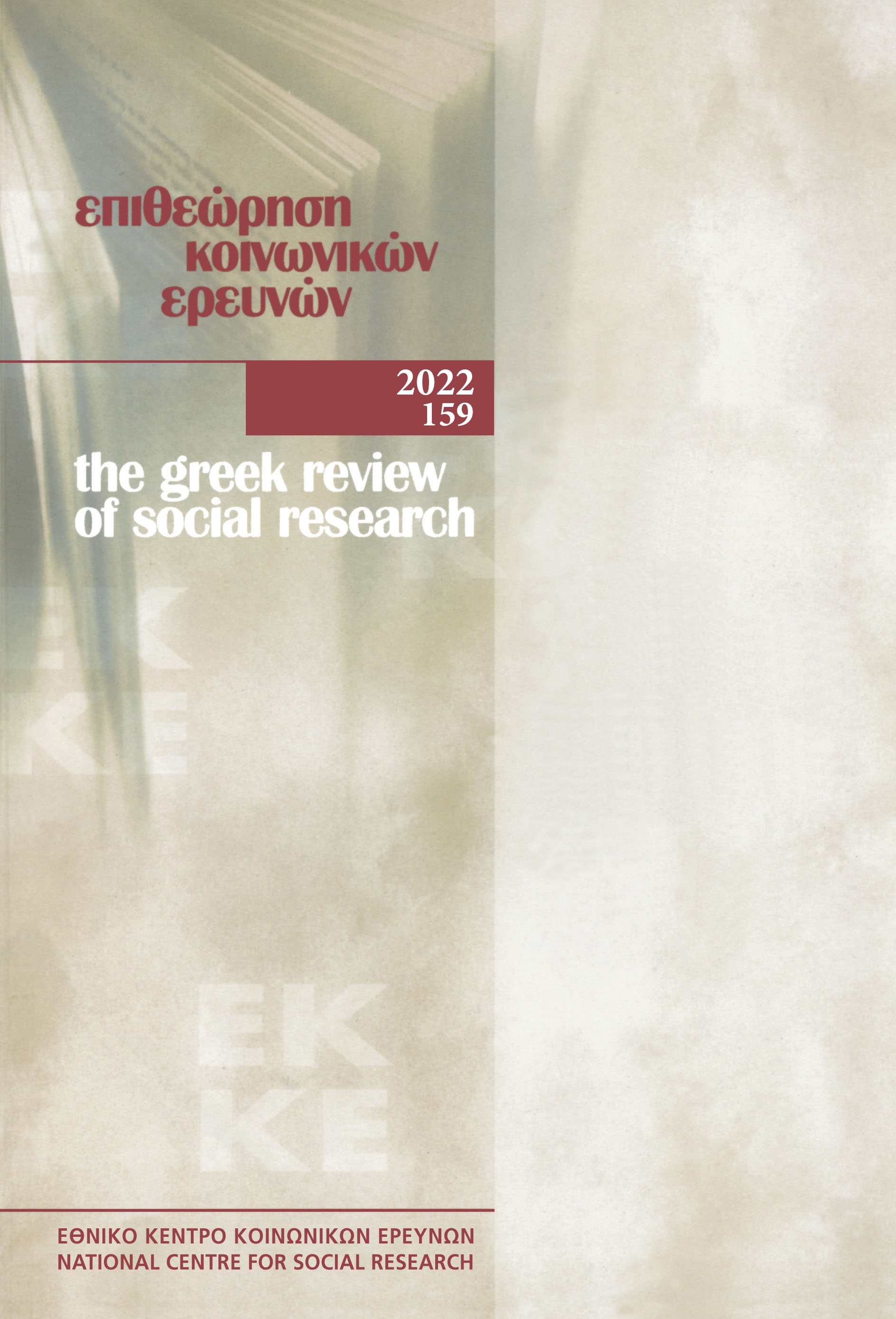Διερεύνηση και θεμελίωση της διαχρονικής συγκρισιμότητας των βασικών εννοιών των ερευνών Οικογενειακών Προϋπολογισμών για την Ελλάδα

Περίληψη
Ο έλεγχος της δυνατότητας διαχρονικών συγκρίσεων αλλά και συγκρίσεων μεταξύ χωρών δεδομένων δειγματοληπτικών ερευνών συνιστά προϋπόθεση για την ανάλυσή τους. Στην παρούσα μελέτη διερευνάται η διαχρονική συγκρισιμότητα των βασικών εννοιών – και των αντίστοιχων μετρήσεών τους – για τις Ελληνικές Έρευνες Οικογενειακών Προϋπολογισμών (1957/1958-2020).
Τα ευρήματα καταδεικνύουν ότι η χρήση περισσότερο λεπτομερών και περιοριστικών κοινών ορισμών για το νοικοκυριό και τα μέλη του, οι οποίοι εφαρμόστηκαν στις πλέον πρόσφατες έρευνες, διασφαλίζουν την συγκρισιμότητα των δεδομένων διαχρονικά. Η εισαγωγή του προσώπου αναφοράς καταδεικνύει μια μετατόπιση στον ορισμό του υπεύθυνου του νοικοκυριού από την ανάληψη των ευθυνών λόγω φύλου σε κυρίως οικονομικά κριτήρια, η οποία θέτει ως όριο το έτος εφαρμογής αυτού του ορισμού για τη διαχρονική συγκρισιμότητα των δεδομένων. Αυτή η μεθοδολογική μελέτη συμβάλλει στην έρευνα για τα ζητήματα των διαχρονικών συγκρίσεων δεδομένων από δειγματοληπτικές έρευνες, που χρησιμοποιούνται εκτενώς στην κοινωνική έρευνα.
Λεπτομέρειες άρθρου
- Πώς να δημιουργήσετε Αναφορές
-
Οικονομάκη Μ. (2022). Διερεύνηση και θεμελίωση της διαχρονικής συγκρισιμότητας των βασικών εννοιών των ερευνών Οικογενειακών Προϋπολογισμών για την Ελλάδα. Επιθεώρηση Κοινωνικών Ερευνών, 159, 123–143. https://doi.org/10.12681/grsr.30828
- Τεύχος
- 2022: 159
- Ενότητα
- Άρθρα

Αυτή η εργασία είναι αδειοδοτημένη υπό το CC Αναφορά Δημιουργού – Μη Εμπορική Χρήση 4.0.
Οι συγγραφείς των άρθρων που δημοσιεύονται στην Επιθεώρηση Κοινωνικών Ερευνών διατηρούν τα δικαιώματα πνευματικής ιδιοκτησίας επί των άρθρων τους, δίνοντας στο περιοδικό το δικαίωμα της πρώτης δημοσίευσης. Άρθρα που δημοσιεύονται στην Επιθεώρηση Κοινωνικών Ερευνών διατίθενται με άδεια Creative Commons 4.0 και σύμφωνα με την άδεια μπορούν να χρησιμοποιούνται ελεύθερα, με αναφορά στο/στη συγγραφέα και στην πρώτη δημοσίευση για μη κερδοσκοπικούς σκοπούς.
Το Εθνικό Κέντρο Κοινωνικών Ερευνών διατηρεί το δικαίωμα να δημοσιεύει, να αναπαραγάγει, να παρουσιάζει στο κοινό, να διανέμει και χρησιμοποιεί άρθρα που δημοσιεύονται στην Επιθεώρηση Κοινωνικών Ερευνών σε οποιοδήποτε μέσο και μορφή είτε μεμονωμένα είτε ως μέρη συλλογικών έργων, για όλο τον χρόνο διάρκειας προστασίας της πνευματικής ιδιοκτησίας και για όλες τις χώρες του κόσμου. Αυτό περιλαμβάνει ενδεικτικά και όχι αποκλειστικά το δικαίωμα δημοσίευσης των άρθρων σε τεύχη της Επιθεώρησης Κοινωνικών Ερευνών, αναπαραγωγής και διανομής μεμονωμένων αντιγράφων των άρθρων, αναπαραγωγής ολόκληρων των άρθρων σε άλλη έκδοση του Εθνικού Κέντρου Κοινωνικών Ερευνών, καθώς και αναπαραγωγής και διανομής των άρθρων ή περίληψης αυτών με χρήση πληροφορικού συστήματος αποθετηρίου.


